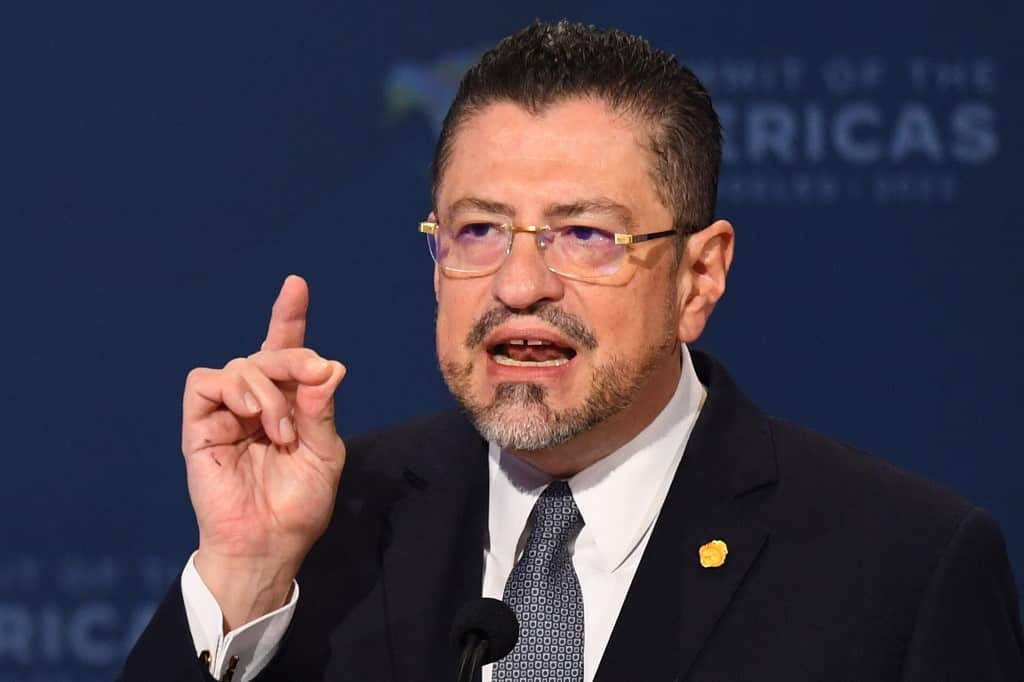Costa Rican President Rodrigo Chaves is taking action to combat the increasing violence and organized crime in the country that has left 2022 as the year with the most homicides. Chaves launched a special operation against organized crime that has led to almost 5,000 arrests, and he has proposed strengthening laws to ensure that there is a probability of punishment.
While he ruled out measures such as mass incarceration, he considers legalizing the recreational consumption of marijuana, which would generate tax revenues and discourage illegal trafficking.
In addition, he called for clearer signals in the United States in the face of the massive flow of migrants in Central America. Despite criticism for asking Congress to file without ratifying the Escazú Agreement, Chaves affirmed that his country has adequate environmental legislation and will continue to lead the environment for generations.
Here are 5 Key Issues Facing Costa Rica according to the President
1. Gangs
Costa Rican President Rodrigo Chaves said Thursday that there is “a lot to fix” to combat drug gangs and affirmed that he will do “everything possible” to avoid a state of emergency in the style of Nayib Bukele in El Salvador.
“What we have to do is to uproot this problem,” said Chaves in an interview, amid criticism for the sustained increase in violent crime over the last decade, which left 2022 as the year with the most homicides (656) since records have been kept in this country of 5.1 million inhabitants.
Chaves launched a special operation against organized crime that in two weeks has led to almost 5,000 arrests and 2.5 tons of drugs and 104 firearms seized. But his crusade generated protests from policemen because it contemplated the reduction of their days off, a measure that was later eliminated.
In addition, the president proposed “strengthening the laws to ensure that there is a probability of punishment”, since many of those arrested are quickly released.
“We have to change the laws and the Judiciary will also have to take action,” he said. Costa Rica is a transit country for cocaine from South America, which is shipped hidden in containers leaving Caribbean ports to the United States and Europe.
“If they can’t get it (drug shipments) out of Costa Rica, they won’t bring it in,” Chaves said. Although security has deteriorated in Costa Rica, it is not comparable to that of other Central American countries, so the president ruled out measures such as the mass incarceration of suspects that President Nayib Bukele is carrying out in El Salvador to combat gangs.
“We will do our best not to have to reach a state of emergency,” he said.
2. Legalize Marijuana
One measure he considers opportune is to legalize the recreational consumption of marijuana. The Executive presented a bill that is pending a vote in Congress, although it has many critics. Medical consumption is legal in the country.
“It makes sense,” Chaves said, as it would generate tax revenues for the treasury and discourage illegal trafficking. “I am not promoting marijuana consumption. What I am saying (is that) there is a reality: if we legalize it, regularize it, give it the visibility it requires, the regulation it requires, both consumers and non-consumers and the Costa Rican state will be better off,” he said.
And he gave as an example country where it is legal, such as Uruguay, the Netherlands and several states in the United States.
3. Help in migration
In terms of migration, Chaves pointed out that Costa Rica is a transit country for migrants to the United States, mainly Venezuelans, and has historically welcomed refugee applicants, such as exiled politicians from Nicaragua.
Both situations are now mixed in this “magnet of migrants”, as Chaves calls Costa Rica, and have saturated a system that gives refugees work permits practically automatically.
But in the middle were hundreds of “economic refugees,” the president said, who traveled on their way to the United States from Colombia and through the Darien jungle via Panama and who, in the face of restrictive measures from Washington, are stranded in Costa Rica.
Chaves called for “clearer signals in the United States” in the face of the massive flow of migrants in Central America so that refugee applications do not pile up: 200,000 when he took office a year ago.
4. Costa Rica Economy
Chaves assured that his country is in an economic “rebirth” by improving unemployment figures (down to 10.6% in the first quarter), inflation (4.2% at twelve months in March) and GDP growth (4.2% in 2022).
Costa Rica “was in terrible conditions”, said this former World Bank official and former Finance Minister under former President Carlos Alvarado.
“The country is much, much better” now, “the people are happy,” he said, even though there are people who complain about high food prices.
“Obviously we have not reached the level of welfare that this country should and deserves to have. But the travel route is in the right direction,” he said.
5. Escazú Agreement
Costa Rica’s policies have always included environmental protection, but Chaves received criticism after asking Congress to file without ratifying the Escazú Agreement, a Latin American environmental protection agreement signed in 2018, promoted by his own country and Chile.
The president rejected the criticism saying that ratifying that emblematic agreement “makes no sense” because Costa Rica had adequate environmental legislation, so the Escazú Agreement would only add “excessive processes” that would slow down the country’s development.
“The Escazú Agreement could have been an improvement in other countries that did not have such a framework,” he said. “Costa Rica has led the environment and we will continue to do so for generations,” he assured.








